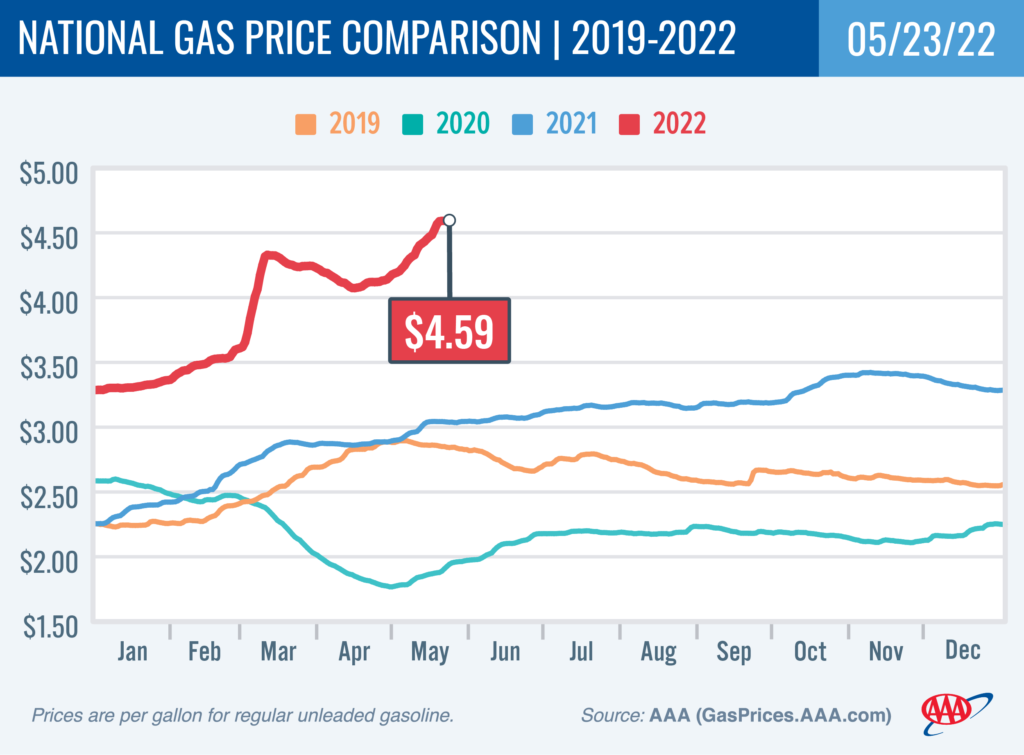WASHINGTON, D.C. — The national average for a gallon of gas has not fallen for nearly a month. Gasoline has either remained flat or risen every day since April 24 and has set a new record daily since May 10.That was the day gas eclipsed the previous record high of $4.33, set earlier this year on March 11. The national average for a gallon of gasoline is now $4.59 and all 50 states are above $4 per gallon.
“Gasoline is $1.05 more than it was on February 24, when Russia invaded Ukraine,” said Andrew Gross, AAA spokesperson. “That sent shock waves through the oil market that have kept oil costs elevated. Domestically, meanwhile, seasonal gas demand is rising as more drivers hit the road, despite the pain they face paying at the pump.”
According to new data from the Energy Information Administration (EIA), total domestic gasoline stocks decreased by 4.8 million bbl to 220.2 million bbl last week. Meanwhile, gasoline demand increased from 8.7 million b/d to 9 million b/d. Tighter supply and increased demand have pushed pump prices higher. This supply/demand dynamic and volatile crude prices will keep upward pressure on pump prices.
Today’s national average for a gallon of gas is $4.59, which is 47 cents more than a month ago, and $1.56 more than a year ago.

Quick Stats
- The nation’s top 10 largest weekly increases: Alaska (+31 cents), Michigan (+18 cents), Indiana (+18 cents), New York (+18 cents), Washington (+17 cents), West Virginia (+17 cents), Ohio (+16 cents), Oregon (+16 cents), New Jersey (+16 cents) and Maine (+15 cents).
- The nation’s top 10 least expensive markets: Oklahoma ($4.04), Kansas ($4.05), Arkansas ($4.12), Minnesota ($4.14), Colorado ($4.14), Georgia ($4.14), Missouri ($4.15), Nebraska ($4.15), Iowa ($4.15) and North Dakota ($4.17).
Oil Market Dynamics
At the close of Friday’s formal trading session, WTI increased by $1.02 to settle at $113.23—nearly $3 per barrel higher than the closing price at the end of the previous week. Crude prices rose after EIA reported that domestic crude supply decreased by 3.4 million bbl to 420.8 million bbl. The current level is approximately 13.4 percent lower than during the second week of May 2021. Additionally, market optimism for China’s efforts to end some COVID-19 restrictions by June 1 helped to bolster the market, which has continued to worry that global crude demand will decline as a result of continuing restrictions. For this week, however, crude prices may decline amid heightened economic uncertainty as the likelihood of a recession increases. A recession would likely cause crude demand to drop amid decreased economic activity and as a result crude prices would decline.
Drivers can find current gas prices along their route with the free AAA Mobile app for iPhone, iPad, and Android. The app can also map a route, find discounts, book a hotel, and access AAA roadside assistance. Learn more at AAA.com/mobile.
